Abstract
The fate of immune response against sporozoite stage in malaria infection was investigated. Two groups (A and B) of mice were inoculated twice with infective sporozoites of Plasmodium berghei. The mice in group A were maintained on chloroquine prophylaxis to prevent the sporozoite infection from causing malaria. Group B animals on the other hand were allowed to develop acute malaria from the infection which was subsequently cured with chloroquine. Upon examination for stage specific immune responses, it was found that the animals in group A produced high antibody titres against sporozoites and none against erythrocytic stages. The mice in group B produced little anti-sporozoite antibodies but had high antibody titres against blood forms. Challenge infection with P. berghei sporozoites showed that group A animals had become resistant against sporozoite-induced parasitaemia, whereas the mice in group B remained susceptible. The possible significance of suppression of protective immunity by malaria in host-parasite relationship is discussed.
Full text
PDF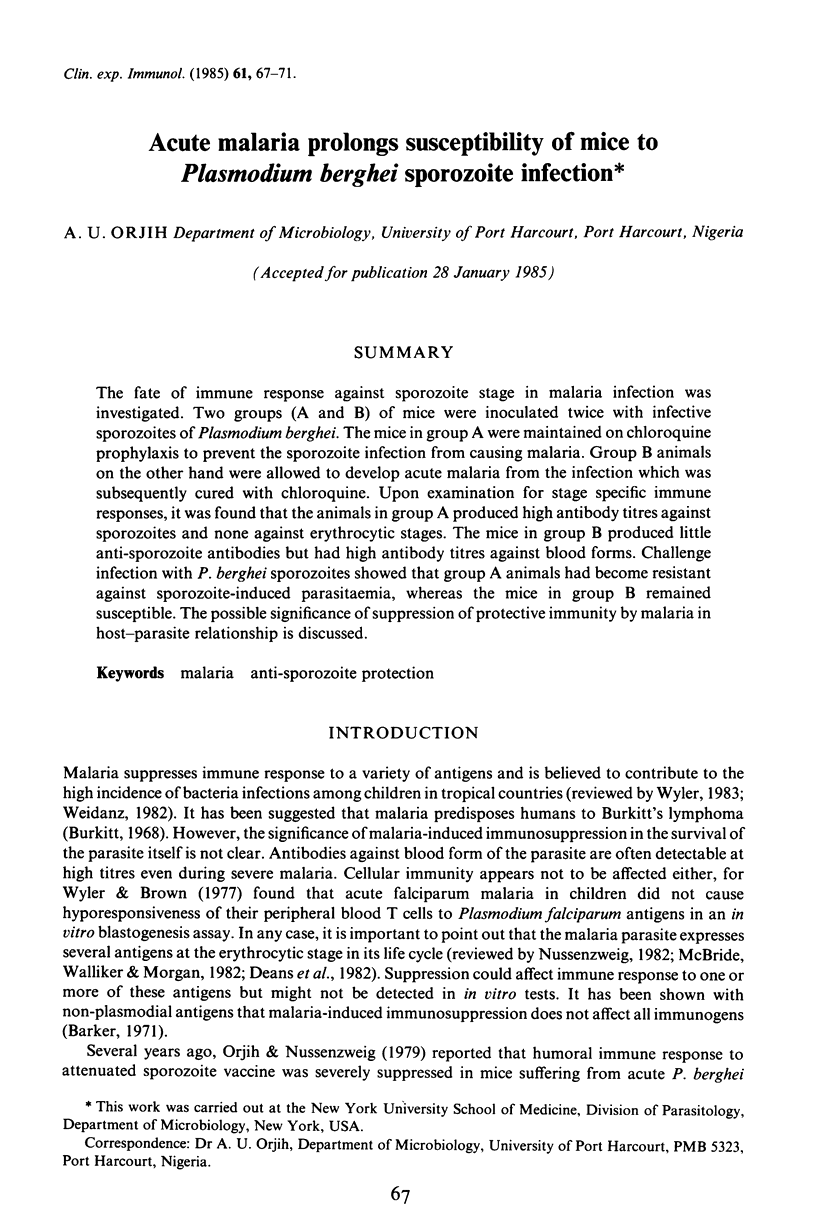
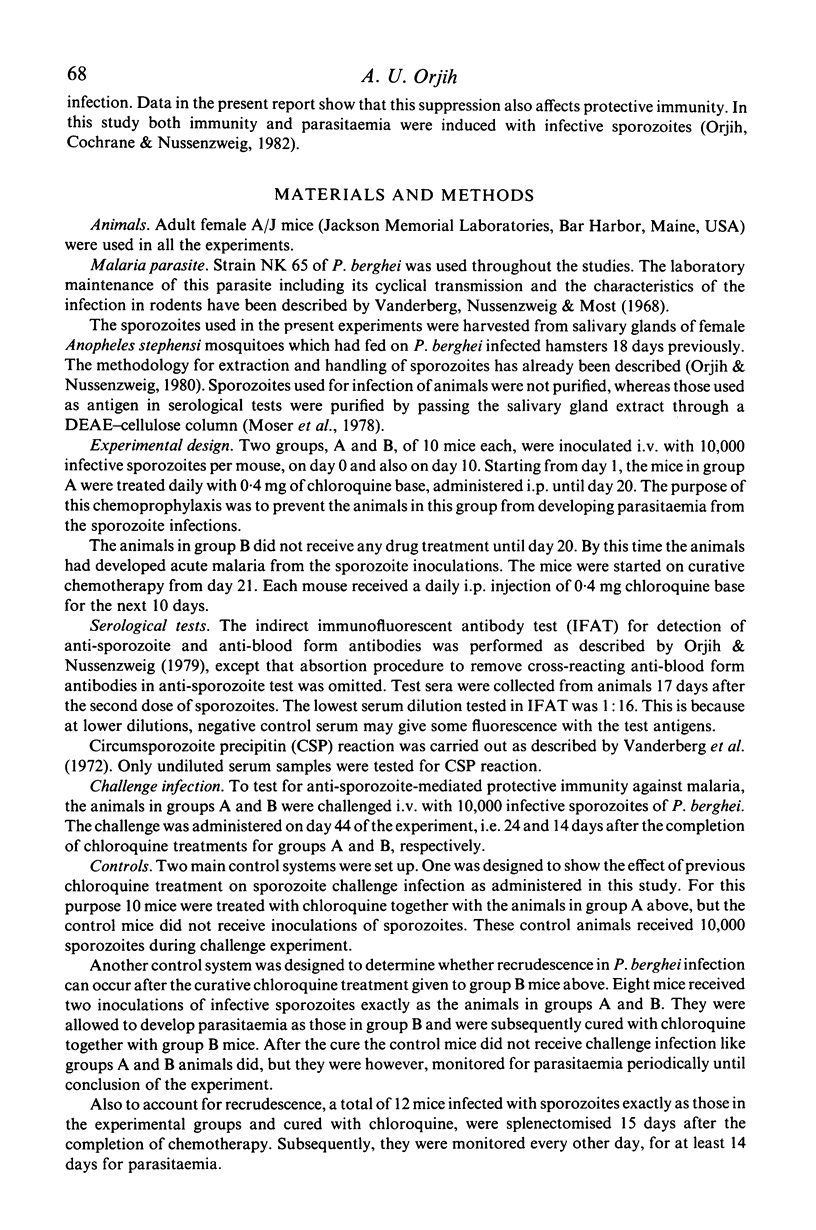
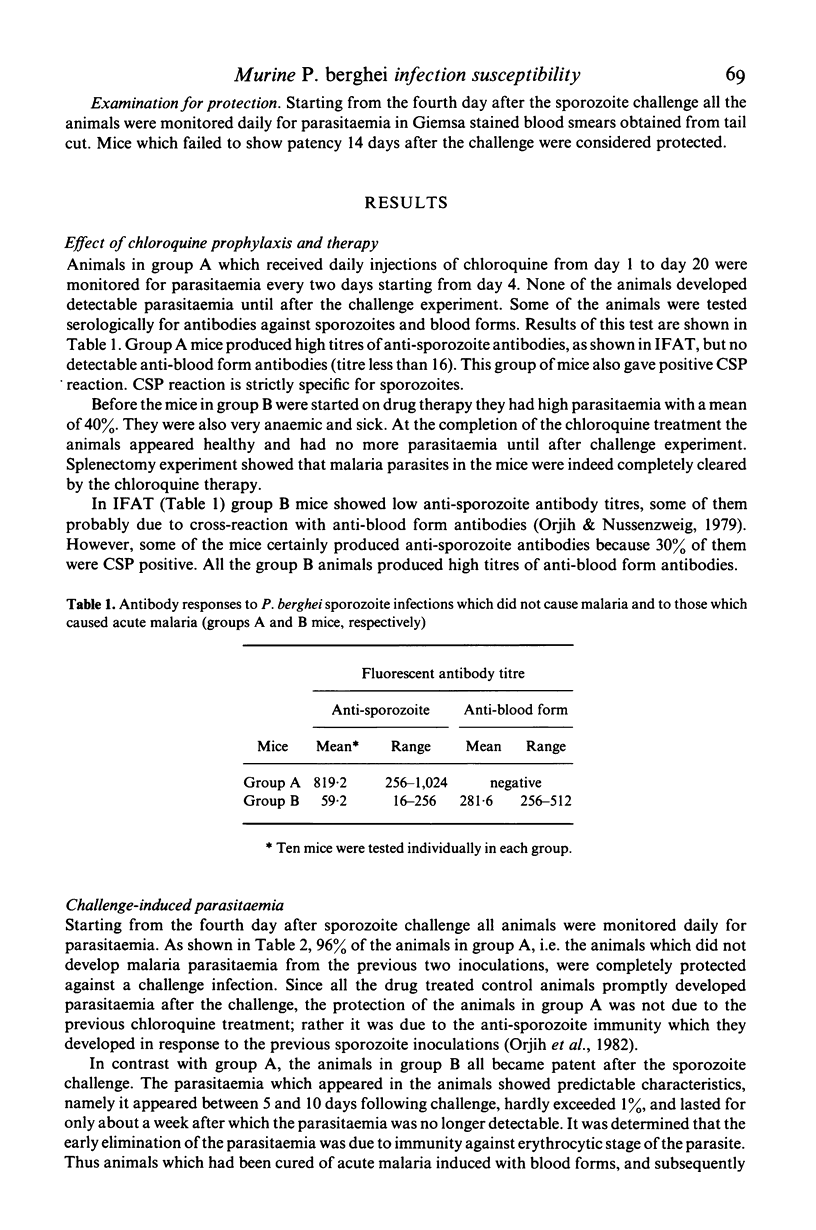
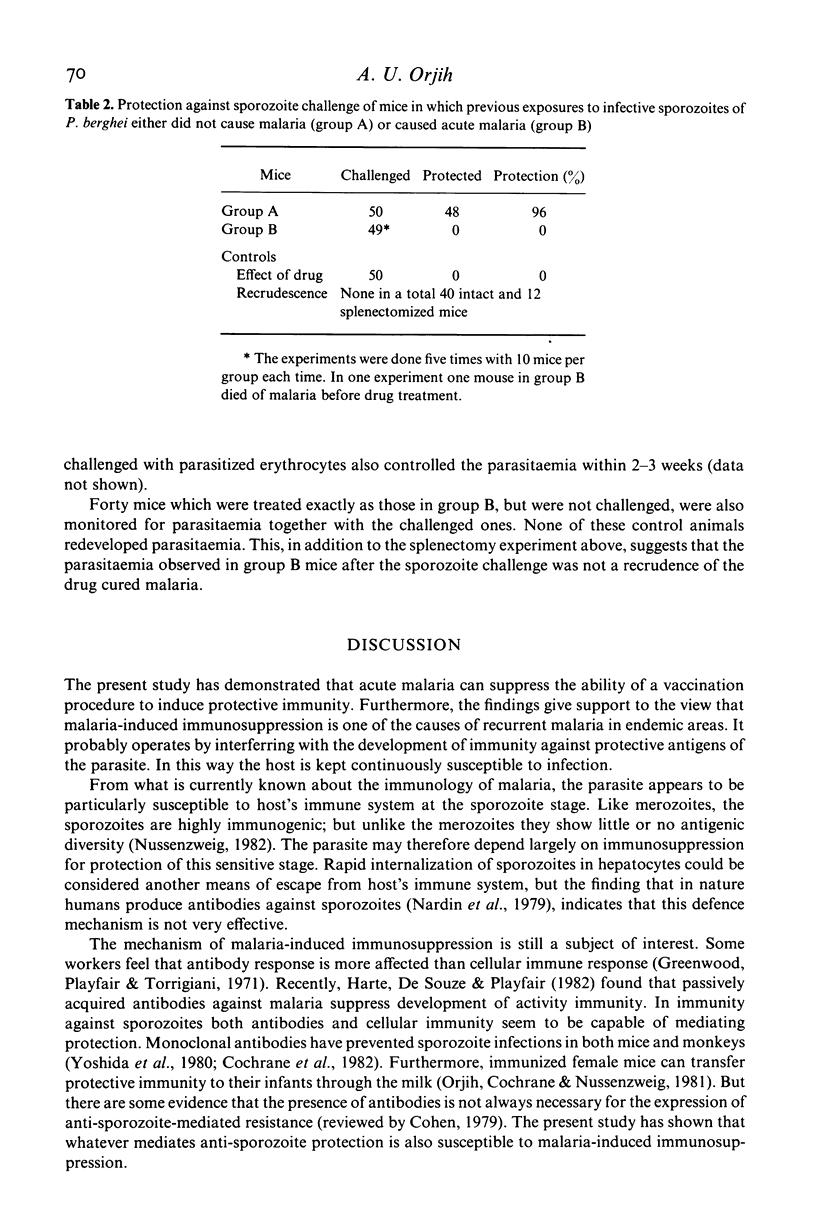
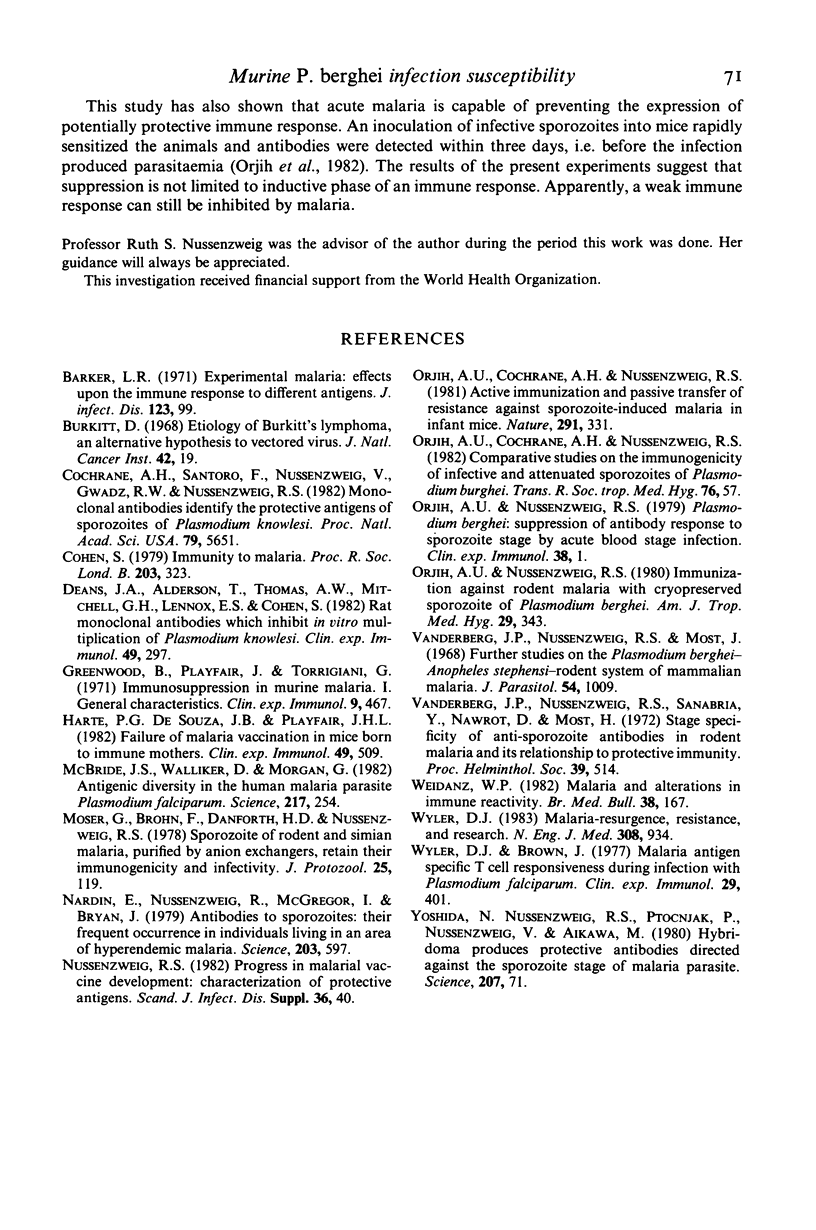
Selected References
These references are in PubMed. This may not be the complete list of references from this article.
- Barker L. R. Experimental malaria: effects upon the immune response to different antigens. J Infect Dis. 1971 Jan;123(1):99–101. doi: 10.1093/infdis/123.1.99. [DOI] [PubMed] [Google Scholar]
- Burkitt D. P. Etiology of Burkitt's lymphoma--an alternative hypothesis to a vectored virus. J Natl Cancer Inst. 1969 Jan;42(1):19–28. [PubMed] [Google Scholar]
- Cochrane A. H., Santoro F., Nussenzweig V., Gwadz R. W., Nussenzweig R. S. Monoclonal antibodies identify the protective antigens of sporozoites of Plasmodium knowlesi. Proc Natl Acad Sci U S A. 1982 Sep;79(18):5651–5655. doi: 10.1073/pnas.79.18.5651. [DOI] [PMC free article] [PubMed] [Google Scholar]
- Cohen S. Immunity to malaria. Proc R Soc Lond B Biol Sci. 1979 Jan 15;203(1153):323–345. doi: 10.1098/rspb.1979.0001. [DOI] [PubMed] [Google Scholar]
- Deans J. A., Alderson T., Thomas A. W., Mitchell G. H., Lennox E. S., Cohen S. Rat monoclonal antibodies which inhibit the in vitro multiplication of Plasmodium knowlesi. Clin Exp Immunol. 1982 Aug;49(2):297–309. [PMC free article] [PubMed] [Google Scholar]
- Greenwood B. M., Playfair J. H., Torrigiani G. Immunosuppression in murine malaria. I. General characteristics. Clin Exp Immunol. 1971 Mar;8(3):467–478. [PMC free article] [PubMed] [Google Scholar]
- Harte P. G., De Souza J. B., Playfair J. H. Failure of malaria vaccination in mice born to immune mothers. Clin Exp Immunol. 1982 Sep;49(3):509–516. [PMC free article] [PubMed] [Google Scholar]
- McBride J. S., Walliker D., Morgan G. Antigenic diversity in the human malaria parasite Plasmodium falciparum. Science. 1982 Jul 16;217(4556):254–257. doi: 10.1126/science.6178159. [DOI] [PubMed] [Google Scholar]
- Moser G., Brohn F. H., Danforth H. D., Nussenzweig R. S. Sporozoites of rodent and simian malaria, purified by anion exchangers, retain their immunogenicity and infectivity. J Protozool. 1978 Feb;25(1):119–124. doi: 10.1111/j.1550-7408.1978.tb03881.x. [DOI] [PubMed] [Google Scholar]
- Nardin E. H., Nussenzweig R. S., McGregor I. A., Bryan J. H. Antibodies to sporozoites: their frequent occurrence in individuals living in an area of hyperendemic malaria. Science. 1979 Nov 2;206(4418):597–599. doi: 10.1126/science.386511. [DOI] [PubMed] [Google Scholar]
- Nussenzweig R. S. Progress in malaria vaccine development: characterization of protective antigens. Scand J Infect Dis Suppl. 1982;36:40–45. [PubMed] [Google Scholar]
- Orjih A. U., Cochrane A. H., Nussenzweig R. S. Active immunization and passive transfer of resistance against sporozoite-induced malaria in infant mice. Nature. 1981 May 28;291(5813):331–332. doi: 10.1038/291331a0. [DOI] [PubMed] [Google Scholar]
- Orjih A. U., Cochrane A. H., Nussenzweig R. S. Comparative studies on the immunogenicity of infective and attenuated sporozoites of Plasmodium berghei. Trans R Soc Trop Med Hyg. 1982;76(1):57–61. doi: 10.1016/0035-9203(82)90019-0. [DOI] [PubMed] [Google Scholar]
- Orjih A. U., Nussenzweig R. S. Immunization against rodent malaria with cryopreserved irradiated sporozoites of Plasmodium berghei. Am J Trop Med Hyg. 1980 May;29(3):343–347. doi: 10.4269/ajtmh.1980.29.343. [DOI] [PubMed] [Google Scholar]
- Orjih A. U., Nussenzweig R. S. Plasmodium berghei: suppression of antibody response to sporozoite stage by acute blood stage infection. Clin Exp Immunol. 1979 Oct;38(1):1–8. [PMC free article] [PubMed] [Google Scholar]
- Vanderberg J. P., Nussenzweig R. S., Most H. Further studies on the Plasmodium berghei-Anopheles stephensi--rodent system of mammalian malaria. J Parasitol. 1968 Oct;54(5):1009–1016. [PubMed] [Google Scholar]
- Weidanz W. P. Malaria and alterations in immune reactivity. Br Med Bull. 1982 May;38(2):167–172. doi: 10.1093/oxfordjournals.bmb.a071754. [DOI] [PubMed] [Google Scholar]
- Wyler D. J., Brown J. Malaria antigen-specific T-cell responsiveness during infection with Plasmodium falciparum. Clin Exp Immunol. 1977 Sep;29(3):401–407. [PMC free article] [PubMed] [Google Scholar]
- Wyler D. J. Malaria--resurgence, resistance, and research (second of two parts). N Engl J Med. 1983 Apr 21;308(16):934–940. doi: 10.1056/NEJM198304213081605. [DOI] [PubMed] [Google Scholar]
- Yoshida N., Nussenzweig R. S., Potocnjak P., Nussenzweig V., Aikawa M. Hybridoma produces protective antibodies directed against the sporozoite stage of malaria parasite. Science. 1980 Jan 4;207(4426):71–73. doi: 10.1126/science.6985745. [DOI] [PubMed] [Google Scholar]


